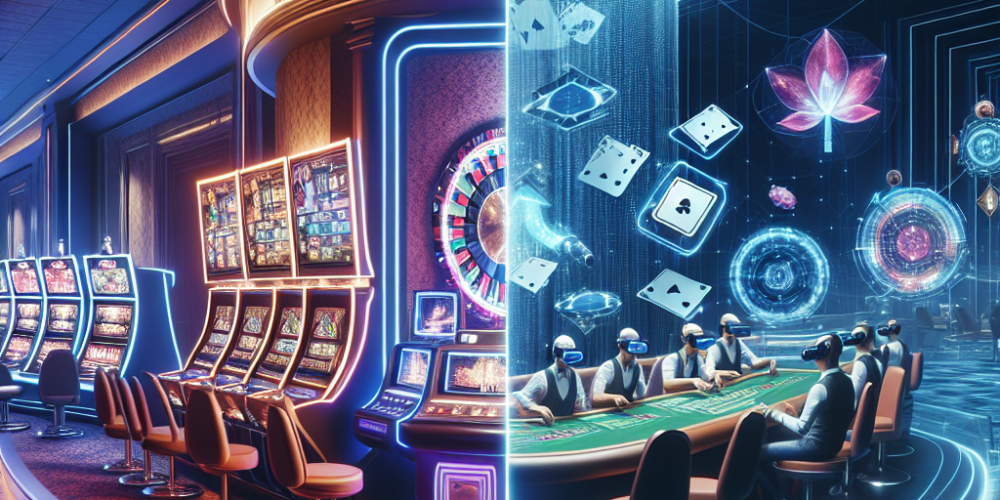In the evolving landscape of gaming, the fusion of technology and traditional casino elements has given rise to a phenomenon that’s capturing the imagination of players globally—virtual reality (VR) casinos. With the continuous advancements in VR technology, the casino industry is undergoing a transformation that promises a more immersive and interactive gaming experience, potentially reshaping the gambling and gaming sectors significantly.
Virtual reality in gaming has been around for a few years, primarily focusing on video games that transport players to different worlds. However, its application in the casino industry is a relatively new trend that’s gaining momentum. VR casinos are designed to replicate a land-based casino atmosphere, providing a fully immersive environment where players can walk around, interact with other players, and engage in games like blackjack, poker, slots, and roulette in a completely virtual context.
One of the most significant advantages of VR casinos is the enhancement of player engagement and retention. The VR experience is profoundly different from playing on a traditional online platform or a mobile app. It encompasses a 360-degree view of a richly detailed gaming floor, with the sights and sounds that one would expect at a physical casino. This depth of immersive gaming not only attracts tech-savvy players but also provides a new thrill to traditional players looking for something different.
Moreover, VR casinos offer the possibility of increased social interaction. Unlike traditional online games, players in VR settings can communicate with each other using voice or chat. They can observe body language, gestures, and expressions of their opponents or fellow players, which can significantly alter the dynamics of casino games like poker where psychological play is as pivotal as the luck of the draw.
The technological infrastructure of VR requires specific hardware, including VR headsets, controllers, and a powerful enough PC or gaming console to handle the detailed graphics and the processing power needed for a smooth, responsive VR experience. Companies like Oculus Rift, HTC Vive, and Sony PlayStation VR are at the forefront of providing these technologies. As the hardware becomes more accessible and affordable, the popularity of VR casinos is expected to grow.
Economically, VR casinos represent a lucrative avenue. According to a report by Grand View Research, the global virtual reality in gaming market size was valued at USD 11.56 billion in 2019 and is expected to grow at a compound annual growth rate of 30.2% from 2020 to 2027. While VR gaming has principally been discussed in the context of video games, its potential impact on the casino and gambling industry is immense, opening up new revenue streams for software developers, hardware manufacturers, and casino operators.
Despite the promising prospects, there are challenges. The primary barrier is the initial investment in VR hardware by consumers. The cost of a VR headset, along with the required computer or console, can be prohibitively high for the average consumer. Furthermore, there are issues related to motion sickness and the health impacts of long periods of VR use that need to be addressed to increase mainstream adoption.
Regulatory hurdles also present a significant challenge. Since gambling laws vary significantly from one jurisdiction to another, deploying VR casinos on a large scale involves navigating a complex legal landscape. The integration of real-money gaming into VR also requires robust age verification processes and security features to protect users from fraud and ensure compliance with gambling regulations.
In conclusion, as we stand at the cusp of what could be the next big revolution in gaming and gambling, VR casinos offer a thrilling glimpse into the future. They blend the excitement and social aspect of traditional gambling with the infinite possibilities provided by digital technology. While there are obstacles to overcome, the potential for VR in reshaping the casino industry is undeniable, promising an exciting ride for players and industry stakeholders alike. As the technology continues to develop and become more accessible, it is poised to become a mainstream offering, changing how people experience gambling forever.

Karine Gomez is an enthusiastic writer and avid gamer with a particular love for PlayStation and casino gaming. Her deep knowledge of gaming trends and casino dynamics makes her articles both informative and engaging. Karine’s passion for PlayStation games and her firsthand experience with casino play shine through in her writing, offering readers authentic insights and valuable tips.

